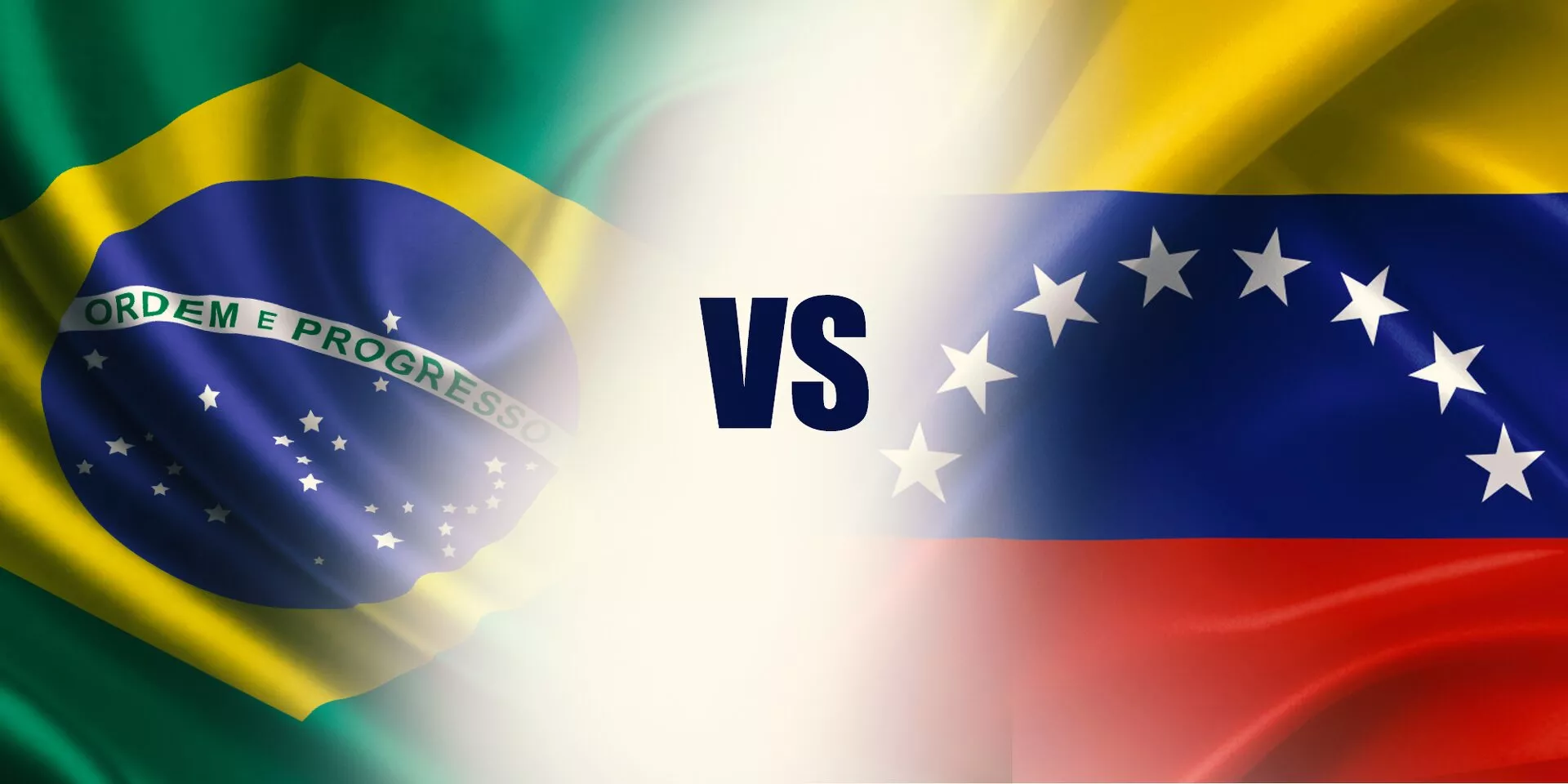The role of Venezuela in international discussions has intensified, with its political, economic, and social complexities placing it at the forefront of debates concerning governance, resource management, and human rights. Understanding Venezuela's standing in the global arena is crucial for anyone keen on international relations and global development.
Venezuela's narrative is one of stark contrasts and intricate challenges. Once celebrated as one of Latin America's most prosperous nations, Venezuela has encountered significant hurdles in recent years. These challenges have prompted comparisons with other countries, particularly in terms of economic policy, governance, and social welfare. This article seeks to deliver an in-depth examination of Venezuela's current situation and its implications when juxtaposed with other nations or global issues.
By delving into the "Venezuela vs" narrative, we will uncover the nation's strengths, weaknesses, and potential trajectories for the future. This analysis is vital for policymakers, academics, and all those interested in comprehending the intricacies of Venezuela's present state and its future possibilities.
Read also:The Grand Ole Opry A Timeless Icon Of Country Music
Table of Contents
- Economic Comparison: Venezuela vs Global Economies
- Political Landscape: Venezuela vs Democratic Nations
- Social Indicators: Venezuela vs Neighboring Countries
- Energy Sector: Venezuela vs Major Oil Producers
- Health System: Venezuela vs Global Health Standards
- Education System: Venezuela vs Regional Benchmarks
- Environmental Impact: Venezuela vs Climate Leaders
- Migration Patterns: Venezuela vs Refugee Crises
- Human Rights: Venezuela vs International Standards
- Future Prospects: Venezuela vs Global Trends
Economic Analysis: Venezuela in the Global Economic Context
Venezuela's economy is profoundly influenced by its abundant oil reserves, which constitute a substantial portion of its GDP. However, mismanagement and political instability have led to economic downturns, making it an intriguing case study when compared to other global economies.
In this section, we will analyze:
- Venezuela's GDP compared to other oil-rich nations.
- The pervasive impact of inflation and currency devaluation.
- Policies that could stabilize the economy.
According to the World Bank, Venezuela experienced unprecedented inflation rates in recent years, surpassing even those of other struggling economies. To reverse this trend, experts recommend implementing fiscal reforms and attracting foreign investment.
Key Economic Indicators
Below are some pivotal economic indicators comparing Venezuela to other nations:
- GDP per capita: Significantly lower than countries like Saudi Arabia and the UAE.
- Inflation rate: Among the highest globally, severely affecting purchasing power.
- Unemployment rate: Rising due to economic contraction.
Political Framework: Venezuela vs Democratic Nations
Venezuela's political structure has been a subject of intense debate, particularly when compared to democratic nations. The country's shift from a democratic government to a more centralized authority has raised concerns about governance and accountability.
This section explores:
Read also:Exploring The Cia Headquarters A Pillar Of Global Intelligence
- The evolution of Venezuela's political system.
- Challenges encountered by democratic institutions.
- International responses to Venezuela's political climate.
Freedom House reports indicate that Venezuela's political freedoms have significantly diminished, impacting its global reputation. Reinforcing democratic institutions could aid in restoring trust and stability.
Political Reforms
Potential reforms to enhance Venezuela's political landscape include:
- Enhancing transparency in elections.
- Encouraging freedom of speech and press.
- Promoting active civic participation.
Social Metrics: Venezuela vs Neighboring Countries
Social metrics such as poverty rates, access to healthcare, and education levels provide critical insights into Venezuela's societal well-being. Comparing these metrics with neighboring countries highlights areas for improvement.
In this section, we will examine:
- Poverty levels and their impact on communities.
- Access to essential services like healthcare and education.
- Social programs designed to address inequalities.
Data from the United Nations reveals that Venezuela's social metrics have deteriorated compared to countries like Colombia and Brazil. Addressing these issues necessitates comprehensive social policies and international support.
Social Challenges
Key social challenges facing Venezuela include:
- High poverty rates affecting both urban and rural populations.
- Limited access to quality healthcare services.
- Disparities in educational opportunities.
Energy Sector: Venezuela vs Major Oil Producers
Venezuela's energy sector, especially its oil industry, plays a crucial role in its economy. Comparing it with major oil-producing nations reveals both opportunities and challenges.
This section covers:
- Venezuela's oil production and reserves.
- Investment in renewable energy sources.
- Strategies to diversify the energy portfolio.
Despite possessing the largest proven oil reserves globally, Venezuela's production has declined due to underinvestment and sanctions. Transitioning to renewable energy could reduce dependency on oil exports.
Energy Diversification
Possible strategies for energy diversification include:
- Investing in solar and wind energy projects.
- Collaborating with international partners for technology transfer.
- Promoting energy efficiency in industrial sectors.
Healthcare System: Venezuela vs Global Health Standards
Venezuela's healthcare system has faced numerous challenges, affecting the health and well-being of its citizens. Comparing it to global health standards highlights areas for improvement.
In this section, we will discuss:
- Access to medical facilities and supplies.
- Prevalence of diseases and health risks.
- Initiatives to strengthen the healthcare system.
Reports from the World Health Organization (WHO) indicate that Venezuela's healthcare system requires immediate attention. Increasing funding and fostering international cooperation could enhance healthcare outcomes.
Healthcare Challenges
Major healthcare challenges in Venezuela include:
- Shortages of medical supplies and personnel.
- Increasing prevalence of infectious diseases.
- Limited access to specialized care.
Education System: Venezuela vs Regional Benchmarks
Venezuela's education system has been affected by economic and social instability, leading to disparities in educational opportunities. Comparing it to regional benchmarks offers insights into potential improvements.
This section analyzes:
- Enrollment rates and educational attainment.
- Quality of education and teacher training.
- Programs to enhance educational equity.
Studies by UNESCO demonstrate that Venezuela's education system has witnessed a decline in quality and accessibility. Implementing reforms and investing in education could help bridge the gap with regional leaders.
Education Reforms
Potential education reforms include:
- Improving teacher training programs.
- Expanding access to digital learning resources.
- Encouraging community involvement in education.
Environmental Impact: Venezuela vs Climate Leaders
Venezuela's environmental policies and practices have significant implications for global climate efforts. Comparing them to climate leaders underscores the need for sustainable development.
In this section, we will explore:
- Venezuela's contribution to carbon emissions.
- Efforts to protect biodiversity and natural resources.
- Policies promoting environmental sustainability.
Data from the Intergovernmental Panel on Climate Change (IPCC) suggests that Venezuela can play a vital role in global climate action by adopting sustainable practices.
Environmental Initiatives
Possible environmental initiatives include:
- Protecting rainforests and wildlife habitats.
- Reducing carbon emissions through clean energy adoption.
- Promoting eco-tourism to support conservation efforts.
Migration Patterns: Venezuela vs Refugee Crises
Venezuela's migration patterns have become a significant global issue, with millions of Venezuelans seeking refuge abroad. Comparing this to other refugee crises provides insights into managing population displacement.
This section examines:
- Causes and effects of Venezuelan migration.
- Regional and international responses to the crisis.
- Policies to support displaced populations.
According to the United Nations High Commissioner for Refugees (UNHCR), Venezuela's migration crisis is one of the largest in recent history. Coordinated efforts are essential to address the needs of displaced individuals.
Migration Solutions
Possible solutions to the migration crisis include:
- Providing humanitarian aid to affected regions.
- Facilitating legal pathways for migration.
- Encouraging regional cooperation to manage the crisis.
Human Rights: Venezuela vs International Standards
Venezuela's human rights record has been scrutinized by international organizations, highlighting areas for improvement. Comparing it to international standards emphasizes the importance of protecting human rights.
In this section, we will discuss:
- Challenges to human rights in Venezuela.
- International efforts to promote human rights.
- Policies to protect vulnerable populations.
Reports from Amnesty International and Human Rights Watch indicate that Venezuela needs to strengthen its commitment to human rights. Implementing reforms and adhering to international standards could improve the situation.
Human Rights Protections
Key human rights protections include:
- Ensuring freedom of expression and assembly.
- Protecting the rights of indigenous communities.
- Preventing arbitrary detention and torture.
Future Prospects: Venezuela vs Global Trends
Venezuela's future prospects hinge on its ability to adapt to global trends and address pressing challenges. Comparing it to global trends provides a roadmap for progress.
This section outlines:
- Opportunities for economic and social development.
- Challenges posed by geopolitical dynamics.
- Policies to align with global standards.
Experts suggest that Venezuela can capitalize on its natural resources and strategic location to achieve sustainable development. Embracing innovation and international collaboration will be critical for success.
Potential Pathways
Potential pathways for Venezuela's future include:
- Implementing structural reforms to stabilize the economy.
- Strengthening democratic institutions and governance.
- Promoting social equity and environmental sustainability.
Kesimpulan
Venezuela's role in the global context is shaped by its unique challenges and opportunities. By analyzing "Venezuela vs" various global issues, we gain a deeper understanding of its complexities and potential pathways forward. Key takeaways from this article include:
- Venezuela's economic challenges necessitate fiscal reforms and foreign investment.
- Political stability and democratic governance are essential for sustained progress.
- Social indicators underscore the need for comprehensive policies addressing poverty, healthcare, and education.
- The energy sector presents opportunities for diversification and sustainability.
We invite readers to engage with this content by sharing their thoughts and insights. Your feedback is invaluable in shaping the discourse around Venezuela's future. Additionally, explore other articles on our site to deepen your understanding of global issues.


